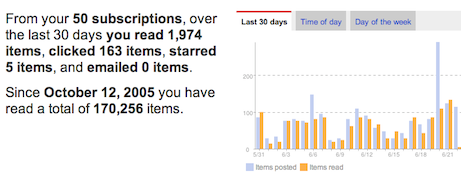Rest in Peace, Reader
by Matt Cholick
I've spent the past few days looking around for a Google Reader replacement. It's been a frustrating search; Reader did such a great job that the alternatives just don't measure up. I've used it since October 2005 to read 170,000 articles. Clearly the software worked well for me. One thing that's jumped out at me since the news was announced is how angry the tone of most articles toward Google is while discussing the alternatives. I skimmed a few comments as well (despite my general life-rule of never reading comments on a news site), and their tone is even more harsh.
I think I would have shared that sentiment several years ago, but I don't today. Over the past several months, I've worked on tooling around managing a portfolio of software products: Rally Portfolio Manager and related things. Because it was an area where I didn't have a lot of experience, I've also been reading quite a bit to try to better understand customers who use the tools I build. What follows is a quote from Escape Velocity:
You remember Gulliver, in the first of his travels, waking up in the land of the Lilliputians, surrounded by little people, unable to move, his giant limbs held captive by an infinitude of tiny threadlike ropes, staked to the ground all about his body...
How is this possible? How can it be that the mighty is so subordinated to the minuscule? In the world of business, it is easy. In any given quarter, you are doing your best to meet your revenue commitments, and not uncommonly you find yourself a bit underpowered to do so and very much at risk of falling short of plan. Indeed, you are much in need of a next-generation giant that could replenish your power. But instead, under the pressure of events and the compulsion to make the quarter, you find yourself taking revenue from wherever you can get it, grasping at any and all straws, fearful of cutting off any source of funds, however small.
...so you fall into a pattern we call majoring in minors, in which the better part of the power your enterprise can deploy is diffused across a plethora of inconsequential transactions, all of which may, or even worse, may not equate to making the quarter. When this tactic does succeed, you get to start the next quarter even further behind the eight ball and see if you can pull it off again. And when eventually you do miss the quarter, as inevitably you must because you have not invested in anything that would allow you to really take charge of your destiny, you get to add the ultimate insult to injury, watching a competitor come out with a next-generation product that's a far cry from what you could have done if only you had just gone and done it. That's how Sony felt when it saw the iPod and how Motorola felt when it saw the iPhone.
-Escape Velocity by Geoffrey Moore
His fundamental thinking, and I strongly agree, is that you should abandon the projects that didn't become material to your business. Google couldn't have known where Reader would go when they launched it in 2005, just as they didn't know how successful Android would become. The world might have gone a very different direction (and I wish it had) where social media was federated and aggregated through RSS rather than consolidated into a few mega-networks. In this alternate reality, Reader might have been the more important product. This isn't the world we live in, though. Reader is immaterial to Google's business. Even if the it's low cost and low maintenance, a mountain of such things can be crushing, as Geoffrey Moore explains.
So I'd like to say to Google: I don't resent that you're shutting down Reader. Go build me a self-driving car. Invent the future and leave RSS readers to someone like AOL.